Dredging poses oyster risk in Gulf St Vincent, experts warn
Experts have confirmed that a rabid disease that infects Pacific oysters would be at risk of spreading into the Gulf St Vincent when Outer Harbor is dredged for widening.

West & Beaches
Don't miss out on the headlines from West & Beaches. Followed categories will be added to My News.
Experts have confirmed that a rabid disease that infects Pacific oysters would be at risk of spreading into the Gulf St Vincent when Outer Harbor is dredged for widening.
Pacific Oyster Mortality Syndrome — which infected the Port River this year — has the potential to spread to oyster farms on the other side of the Gulf, they have told Messenger Community News.
The South Australian oyster industry is worth about $37 million to the state’s economy — and is already in the throes of a downturn due to an oyster larvae shortage.
University of Adelaide marine ecology research associate Dominic McAfee confirmed the spread of POMS through the Gulf was “a possibility and a concern”. He said any barnacle or creature that could house water from the Port River could potentially spread the disease.
“You only need one rabid female that survives the transportation and you’ve potentially got a new gene pool in the Gulf,” Mr McAfee said.
“It seems a double standard that you’re not allowed to take shellfish from the Port and there are other biosecurity issues ships have to take into account … when they’re leaving the Port such as cleaning off barnacles, then they go and dump this in the middle of the Gulf. You don’t know what other pathogens you’re moving and you do have invasive Pacific oysters in the Port which we don’t want to see spreading around the Gulf.”
In order for the disease to be removed, the dredged dirt would have to be drained of water and left to dry for days.
Conservation Council of SA chief executive Craig Wilkins said a number of his member groups were “highly concerned” about the spread of POMS through the Gulf.
He had met with Planning Minister Stephan Knoll, private port operator Flinders Ports and the Environment Protection Authority to discuss the issue.
“They’ve downplayed the risk, suggesting that the process of dredging will provide enough disturbance,” Mr Wilkins said. “They implied that (the risk) would be significantly reduced. This is a particular virus that has caused havoc in other states and we should be doing everything we can to prevent the spread in SA. When we know there is a live risk in our part of the state for its spread, this seems very shortsighted.”
The development approval for the dredging included a requirement for Flinders Ports to “minimise the risk factors associated with the spread of POMS”.
Mr Knoll said the State Government would monitor the issue “very closely” and ensure “every appropriate precautionary measure is taken”.
The disease can spread rapidly and has the potential to kill 100 per cent of commercial Pacific oyster stocks within days of being detected.
A ban on the taking of shellfish from the Port River has been in place since March.




